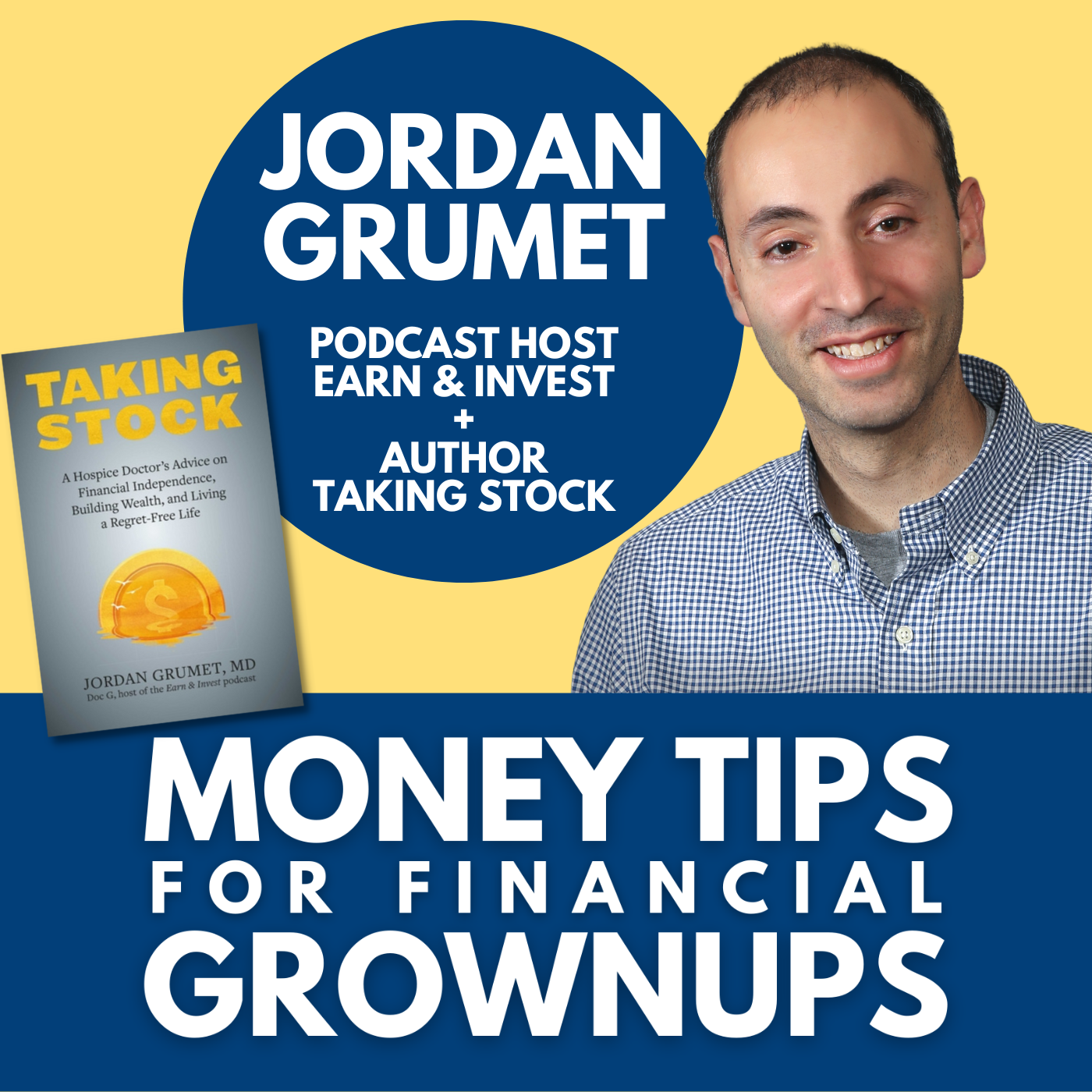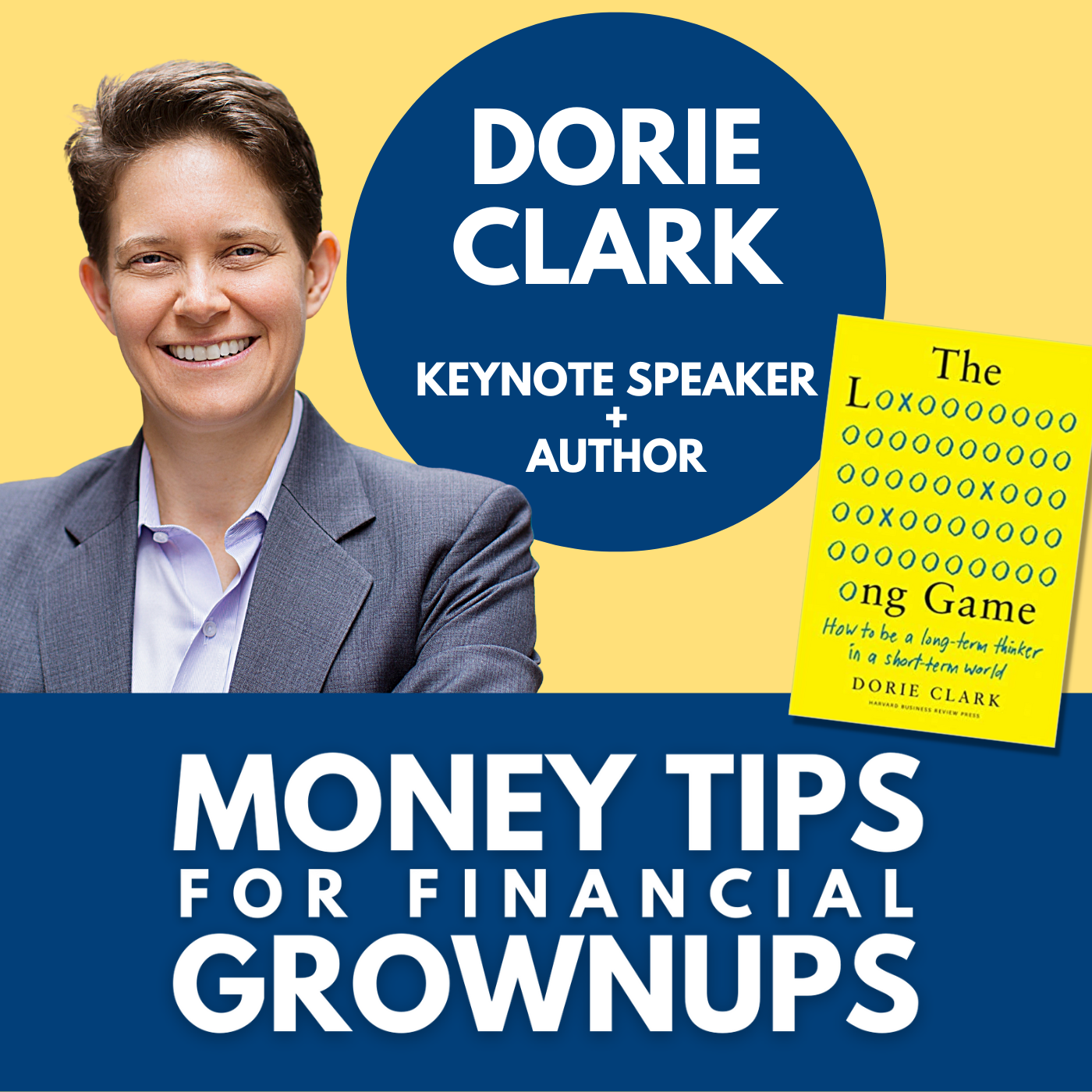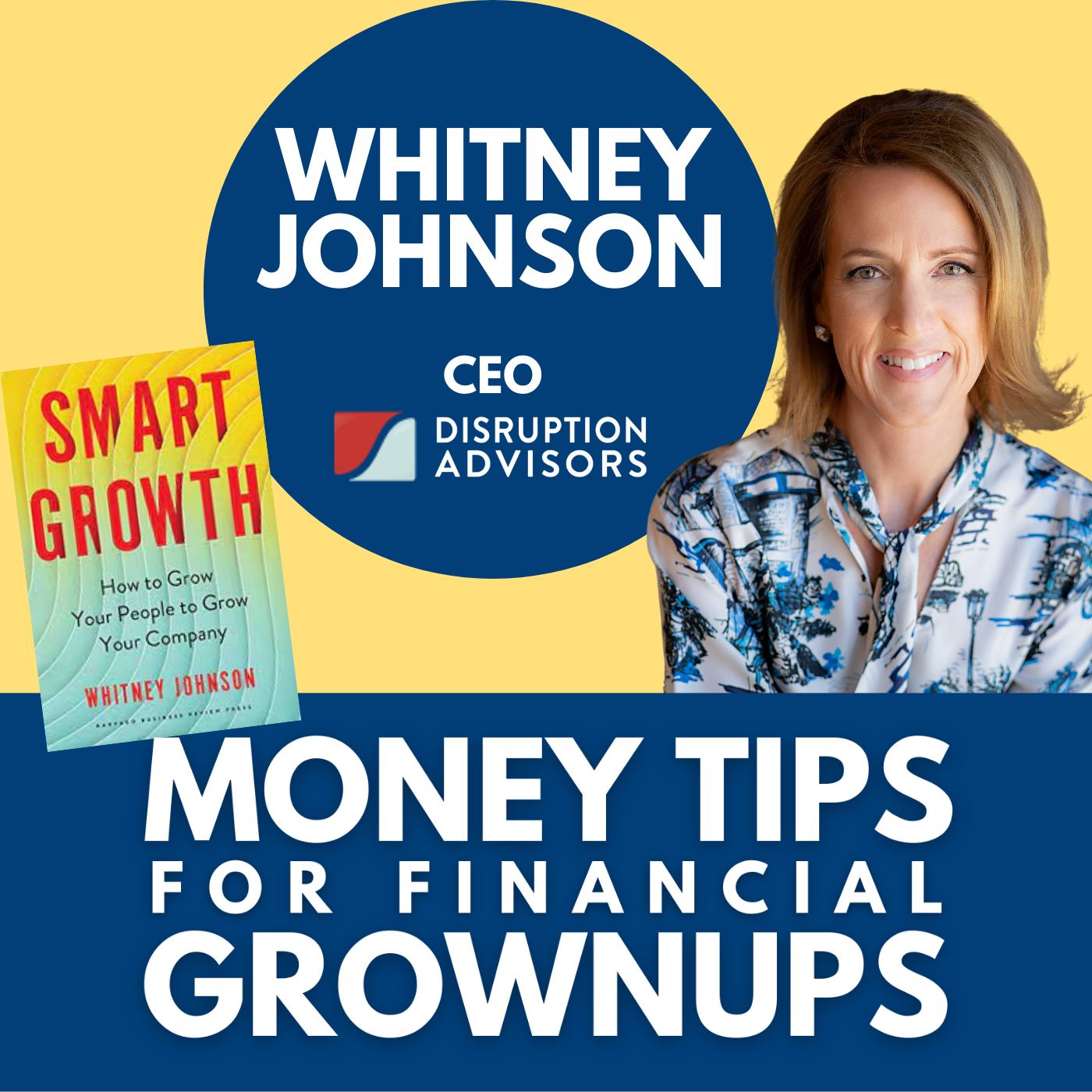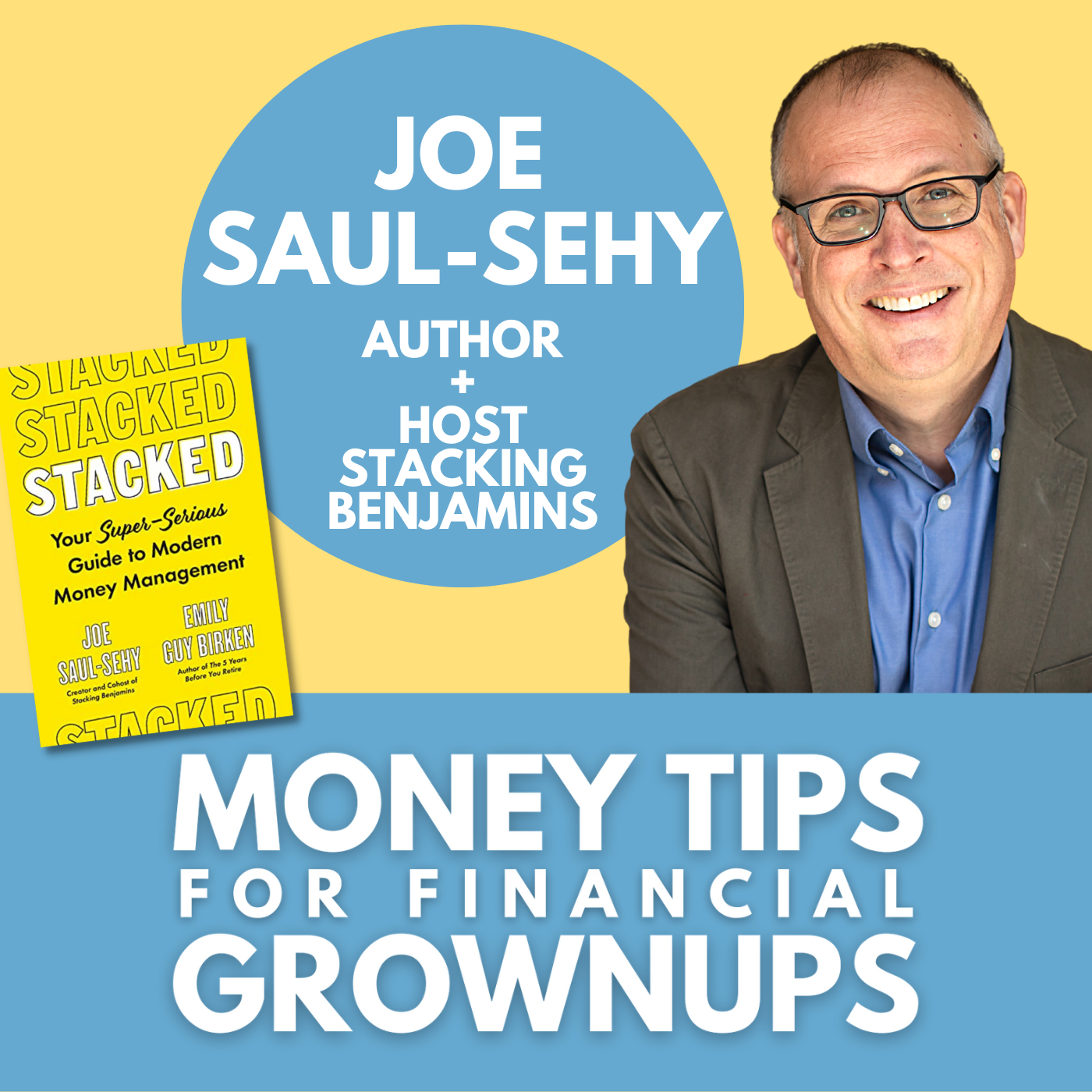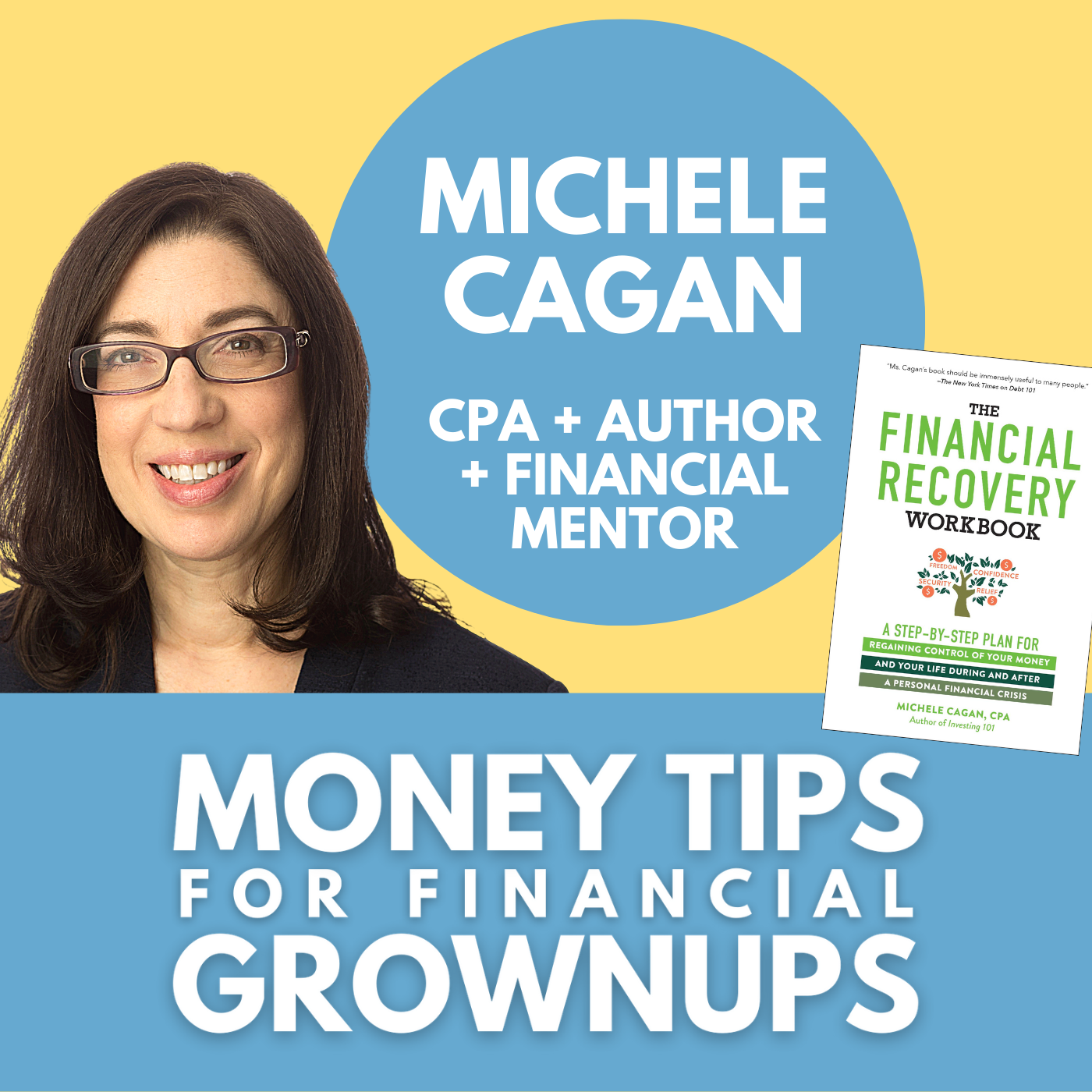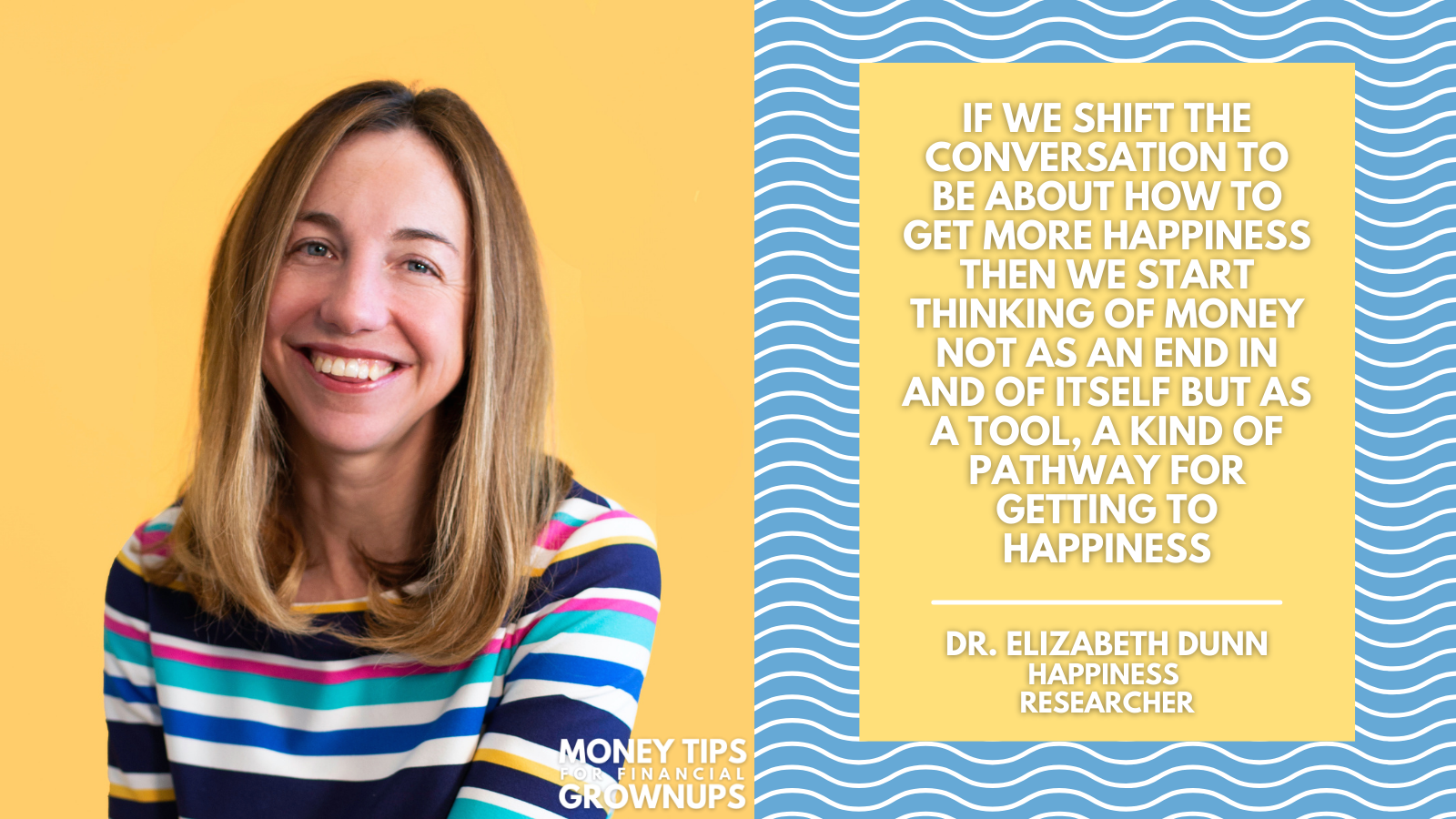The author of Taking Stock: A Hospice Doctor’s Advice on Financial Independence, Building Wealth, and Living a Regret-Free Life, Dr. Jordan Grumet shares his top money tips learned from working with patients in hospice care.
Follow Jordan!
Twitter - @earnaninvest
Website - https://jordangrumet.com
Website - https://www.earnandinvest.com
Jordan’s new book - Taking Stock
Follow Bobbi!
Instagram - @bobbirebell1
Twitter- @bobbirebell
LinkedIn- Bobbi Rebell
Website- http://www.bobbirebell.com
Did you enjoy the show? We would love your support!
Leave a review on Apple Podcasts or wherever you listen to podcasts. We love reading what our listeners think of the show!
Subscribe to the podcast, so you never miss an episode.
Share the podcast with your family, friends, and co-workers.
Tag me on Instagram @bobbirebell1 and you’ll automatically be entered to win books by our favorite guests and merch from our Grownup Gear shop.
Full Transcript:
Bobbi Rebell:
Hey Grownup friends, a big thank you to so many of you that have already bought my new book, Launching Financial Grownups: Live Your Richest Life by Helping Your (Almost) Adult Kids Become Everyday Money Smart. This book was not easy to rate because I had to get honest with myself about what was working with my teen and young adult kids and what was not working. I also had to be prepared to share with all of you. So first of all, thank you for your support and your wonderful responses to it. There's definitely some things in there that you may not have been expecting to hear. By the way, I got a lot of help from my money expert friends and also financial therapists and parenting experts. I am really happy with how Launching Financial Grownups came out, even though it really was hard to be, like I said, that honest and it was a lot of work, but I really love doing it and I'm really happy with how it came out.
On that note, if you have not already, please pick up a copy of Launching Financial Grownups today. After you do, please share it on social media. Please leave a review on Amazon. Those reviews are super important because the algorithm picks up on them and that can make the book a lot more visible to more people. So I truly appreciate it and I really also appreciate all of your support.
Jordan Grumet:
The dying rarely say, "I really regret that I didn't invest in Apple." They don't say, "I really regret that I didn't invest in that major piece of real estate that I was interested in." What they say is, "I wish I had invested more in people. I wish I had invested more in education. I wish I had invested more in that hobby that really lit me on fire and I never had enough time to do it because I was always busy working. I wish I invested in traveling to that place that really was important to me and where I really felt at home."
Bobbi Rebell:
You are listening to Money Tips for Financial Grownups with me, certified financial planner, Bobbi Rebell, author of Launching Financial Grownups. Because you know what? Grownup life is really hard, but together, we got this.
Hey Grownup friends, you know when someone famous passes away and the media puts out these montages with highlights of their life? Have you ever thought, "What would be my highlight reel? What would be my legacy?" And is it really going to be something like, "Oh yeah, they bought Microsoft stock at exactly the right time. Genius"? Or maybe, "They really nailed that work presentation." Yeah, exactly. I don't think that's what you want.
So I'm really excited about this week's guest. He is Dr. Jordan Grumet. He is also known as Doc G. He is the author of a new book called Taking Stock: A Hospice Doctor's Advice on Financial Independence, Building Wealth, and Living a Regret-Free Life. Jordan is still a practicing doctor, caring primarily for patients in hospice care. That means basically at the end of their life, so it's a time when there's a lot of reflection. The book was inspired by the stories that they told Dr. Jordan, Doc G, both about the way that they regret things, the things that they wish they'd done differently, but also the good stuff. Dr. Jordan Grumet has spent years blogging about financial independence and wellness. He also launched, by the way, the award-winning Earn & Invest Podcast in 2018. In 2019, he received the The Plutus Awards for Best new Personal Finance podcast. Check out Earn & Invest. But right now we're going to talk primarily about his new book. Here is Dr. Jordan Grumet, AKA Doc G.
Jordan Grumet, AKA Doc G, welcome to the podcast. You are a financial brought up and I'm so happy to have you here.
Jordan Grumet:
I'm so happy to be here with you this morning.
Bobbi Rebell:
Congratulations. You are out with your first highly anticipated, I should say, your highly anticipated first book Taking Stock. I know you spent years working on this. It was something we've talked about behind the scenes for quite some time. It focuses on your experience as you're still an active hospice patient doctor. Tell us about the book and the perspective, the unique perspective that you have on money and life.
Jordan Grumet:
So this book encapsulates the two streams of my life that came together unexpectedly. My father died when I was seven years old. He was a doctor. I decided I want to be a doctor to be just like him. I became a doctor and then I burned out. I no longer identified with the profession, I wasn't enjoying it. So I went on a search to figure out how I could leave medicine. I learned that I could become financially independent and that was the way to do it. I eventually realized I was financially independent and started pulling back from medicine. And while I was doing that, I discovered the one thing I loved was doing hospice work that was taking care of the dying. So as I was not identifying with being a doctor, the one thing I still did was this hospice work. So I started pursuing financial topics, public speaking, writing, blogging.
And as I talked more and more about personal finance, I realized the how wasn't as important to me. There were a lot of great people who could tell you how to get towards financial independence, but what was more interesting to me was the why. Why do we do what we do and what next once you start actually accumulating some wealth? And funny enough, the answers started coming from my dying patients when I talked to them about the regret they had, what they wish they did and didn't do in life. I felt like the information was so germane to all of us also struggling with our finances, except maybe we could use all this advice much earlier when we were younger, when we had more time to make changes. So these two ideas came together and became Taking Stock, the book, about my experience as a hospice doctor, but also a personal finance podcaster and writer.
Bobbi Rebell:
And you've really been torn between sort of these two careers. So I love it that you now have this hybrid in your life where you are still a practicing doctor and yet you're also, as you talk about in the book, you're a communicator. Can you talk a little bit about how each compliments the other as you live your life?
Jordan Grumet:
So when you become a doctor, if you're going to be good at it, you have to learn how to really communicate with people. So I had a lot of experience talking to people about illness and disease and taking complex ideas and bringing them towards the simple so that people could understand what was going on with them in their body. But I realized that was part of the pleasure.
I also liked to write and public speak, and I had a medical blog that I did for years starting in 2005, but I would always take that communication type activities that I so much loved and I would fit them into really small time periods when I wasn't busy working. So I said, "Well, writing, public speaking, those are the kind of things I can't do for a living. But if I have a few moments here and there, I'm going to do them because they're this hobby that I really love."
When I realized I was financially independent, I had to do a search for who I am and what I really want my life to be about. I realized that those small snippets of time that I was spending being a communicator actually were the parts of my life I enjoyed most. So then I had to learn how to pivot. So I started subtracting out the things from my work-life as a doctor I didn't like, the things that were causing friction. And as I got rid of nights and weekends in my busy practice that was stressing me out, what I was left with was this hospice work that I would do even if I wasn't getting paid for. But doing that 10 or 15 hours a week, I then had all this other time and so I could pursue these other things, this being a communicator.
And so I found that they fit really well together. It wasn't that I wanted to throw the baby out with the bathwater, I didn't want to get away from medicine completely. I just wanted to stop doing the things that didn't feel as purposeful to me. And this allowed me to kind of do both. I found that they actually relate really well with each other because again, I think that dying have a lot to teach the living. And this was a perfect way in which I could intertwine these two parts of my life.
Bobbi Rebell:
We're going to get to some money tips that you've brought along in just a few minutes, but I do want to pick up on something. You talk about communication so much. What tips do you have for communicating between the generations when it comes to money? Because those conversations are so awkward.
Jordan Grumet:
They really are awkward conversations. So the question is, how can we talk, especially to our parents if we're in that sandwich generation the way you and I are, usually in your 30s, 40s, and 50s where your parents are getting older, you know they have financial issues, those financial issues may or may not affect you, but they're also going to affect the quality of their life as they get older? We are lucky enough to be interested in personal finance. So we're learning and reading all these things about how to manage our finances, but part of that is also communicating with them. So the question is how do you bring up these really, really touchy subjects.
And I mentioned a few in the book. There's some really good ways to start talking to your parents about money. One is to ask them for advice even if you don't need it, right? So it's a great thing to go to your parents and say, "You know what? I've started doing my own estate planning. I'm looking at wills and trust. There's a lot of information there. What have you guys done? What did you find? What do you think works? What do you think doesn't?" This is a really great non-confrontational way to start talking about money with them. And because they feel like they're giving you advice and they may be giving you advice, they may teach you something. But even if you know something about it, this idea that they're giving you advice will make them much more open to speak about these things. So I think that's a great conversation opener.
Another great conversation opener is to mention you know someone who had a bad experience. So I tell the story in a book of a guy whose mother got Alzheimer's and therefore lost the ability to manage their finances. But he was lucky because his dad was doing everything and managing all the finances and taking care of everything. But something happened. His dad got COVID and ended up on a respirator. This gentleman realized that the dad had the financial power of attorney. So he can't make any decisions because he's on a ventilator. The mom has dementia and can't make any decisions. But he didn't have the legal ability. While his father was still alive but incoherent, he didn't have the legal ability to manage the finances. So a great way to start having this conversation with your parents is say, "Remember my friend Johnny? Well, the darnedest thing happened to him." Tell that story and said, "Hey, we've never talked about this kind of stuff. Have you ever thought about it?" Again, mentioning the things that have befallen other people is a great way to start the conversation.
And last but not least, another wonderful way to start having this conversation is as opposed to speaking about money, talk about legacy, say, "Hey, mom and dad, I'm getting older and you both are getting older. We just had grandkids. I've been thinking a lot about my own legacy. I was wondering what you want your legacy to be for me and the kids?" A lot of parents, for instance, have a summer cabin or a lake cabin, right? The whole family gathers there. That's like a great, great intro. It's like, "You know that cabin we always go to every year and the grandkids love it and we love it, et cetera? Well, that's a great memory of who you are and how you've built this family. What's going to happen after you're gone? Are you going to want us to still keep going to that cabin and thinking about you?" So again, talking about legacy as opposed to, "Hey, mom and dad, how are we going to split up your money or your things when you're not here?" I think those are some really great ways to start that complicated conversation.
Bobbi Rebell:
And it really has the overarching feeling of love and concern and family bonding, which is so wonderful. I want to get to a few quick money tips. You have so many in your book Taking Stock. First money tip, I want to pick up on something you mentioned just earlier in this interview, subtraction. You love using the term subtraction and you mentioned you did it yourself. Tell us more about what that means and how people can apply that to their own lives.
Jordan Grumet:
Here's where I really want to remind people, money is a tool and it's a tool so that we can eventually live a life of purpose, identity, and connections, but it's one of many tools. So we don't only have money. We have our energy, we have our passions, we have our knowledge, we have our relationships. All of these things are also tools that we can utilize. So let's say you're in your 20s and you're stressed out in your 8:00 to 6:00, but you need the money. Well, when you're young, you have a lot of energy. Maybe you're not married, maybe you don't have kids yet. What if you on a random Saturday night decided to say, "I'm going to spend three hours every Saturday night doing a side hustle. And I'm going to pick a side hustle that's really purposeful for me. Something that's I'm passionate about, something I would do even if I wasn't getting paid for"?
I did this when I was really young. I started a business where I sold art. I didn't care whether I made money or not because I was just so passionate about it. So what if you started this kind of side hustle and you did it for six months? Three hours a week on random Saturdays when you had this tool of energy because you're a young person. After six months, let's say it created some revenue, could you not then push back on the 8:00 to 6:00 and make it a 9:00 to 5:00 or maybe work four days a week? Maybe if you started building more revenue, you could start subtracting out your work which you don't like, and adding in more and more of that side hustle, which is creating money. Let's say the other way around, it doesn't make any money. Well then at least you spent three hours a week doing something that was full of purpose and passion for you. So there's no loss there.
So the idea again is how can we utilize or toggle the different tools we have to start subtracting out the bad stuff now and adding in the good stuff, the stuff that helps us with purpose and identity. So I think we can use subtraction even at a young age. Sometimes that means changing employers and doing the same thing because you don't like your employer. Sometimes it means staying in the same job but switching jobs from something you like less to something you like more. Sometimes if you have a little bit of financial space, it means backing off and working a little less and realizing you may not retire for five or 10 years later than you thought, but you'll be enjoying life today. So this idea of subtraction, I want to bring it into people's lives when they're young and when they're not as financially stable, and then definitely utilize it when your finances are better.
Bobbi Rebell:
I just want to add to your point, that I made the mistake of assuming I could not cut back when I was working crazy hours as a business TV anchor. What I realized was that if I stood my ground and delegated some things to people, that it wasn't so good for my career, for example, to not be on the call to London at 7:00 AM or to not be on the call to Tokyo. This is when I was in sort of a management position. I had to seed that which maybe wasn't the best thing for my overall career, but I realized that I really could work an eight-hour day and not apologize. People said, "When do you come in?" And I just would say, "My hours are 10 to 6:00 and that was it. And I didn't apologize. I was in a position where those were legitimate hours and nobody had asked me to work the longer hours. I just for some reason had it in my head that I had to.
So I think that even if you are in a position where you need the job and you need the money, which was absolutely the case, really think about what would happen if you sort of not necessarily pushed back, but created boundaries more at work without apologizing and see how it goes. I think a lot of employers are a lot more receptive these days to employees kind of putting up some boundaries, as I said, and really rather than have them burn out. I think most employers don't want you to quit or go to the competition because you're being burned down. And they're usually unaware that you're working so many hours. They just don't even know. And they might not even notice if you cut your hours so much and the person that you delegate some work to might be very happy to have that higher profile assignment.
I want to ask you just one more money tip. Talk about we've had so much turmoil in the stock market as we recorded this in the summer of 2022. You talk about investing as wisely in your life as you do in the stock market. And I think this is an important money tip because we do sometimes get caught up because we see the numbers in our account. Sometimes we have emails that we may get that I've actually turned off at times. I don't necessarily want to note day by day what's happening in my retirement account. We don't need to know that. Elaborate more on this Melanie tip about really focusing on your life versus the stock market.
Jordan Grumet:
Well, here's again one of those great messages from the dying. If we're talking about investments, the dying rarely say, "I really regret that I didn't invest in Apple." They don't say, "I really regret that I didn't invest in that major piece of real estate that I was interested in." What they say is, "I wish I had invested more in people. I wish I had invested more in education. I wish I had invested more in that hobby that really lit me on fire and I never had enough time to do it because I was always busy working. I wish I invested in traveling to that place that really was important to me and where I really felt at home."
I think investments are important, but again, I think the monetary investments are just one of the many investments we make. And we tend to forget, we always talk about how money compounds, but we forget that experiences compound and knowledge compounds and relationships compound and that ends up being a real wealth. That's that compound growth, that wealth that we build as we get older and older and that ends up being way more important than the money in the end. That ends up being what we live for. It's just really hard to see that sometimes, especially when we're young.
I also think that we put money out there as a goal because it's just so much easier than thinking about these really difficult things. Like, who do I want to be and what is living my best life and do I have the energy to do that work now and forego the easy stuff? Because although getting to financial independence or having a lot of money isn't "easy," it's pretty knowable, right? We know the steps. We know that we can work harder. We know that we can side hustle. We know that we can invest.
These are all things even if we don't quite understand them, we know we can find a blog or a podcast or a book that's going to teach us this, but it's much harder to say, "What are those investments I need to make today in my purpose, identity, and connections?" Because they're going to continue paying those important dividends and it's the harder work. So we stay away from it and we ignore it and we don't like this idea that life is finite and we might not eventually get to our true goals. So instead of working on those true goals, we work on something that's a lot easier like money and career.
Bobbi Rebell:
Final question, what is the number one takeaway you've learned from the dying? What's your takeaway there?
Jordan Grumet:
The number one takeaway similar to what we were talking about is invest first in your purpose, identity, and connections. And using that knowledge, then build a financial framework. So put purpose, identity, and connections first. That doesn't mean that we have to drop everything and go for a job we're passionate about, but before we start making all those financial decisions, I think we should have those ideas in the forefront so that we can be really intentional about doing things we don't like to do. So I'm not saying we should never do things we don't like to do. It may serve us, it may serve us to work at a job we don't like. It may serve us to work long hours at times, but I want us to be intentional about that so that it can eventually serve our purpose, identity, and connections because I think that's what happiness really looks like.
Bobbi Rebell:
I do just want to clarify because you do talk about in a book that you very much did this earlier in your career. So there was this thesis of your life where you were a total workaholic, you were missing family events. You learned from that experience, yes, but you also benefited from the money that you banked at the time. So it's not that you shouldn't have seasons of your life where you do work for the money for a defined period of time if that's going to get you to your goals. So I just want to add that from your book because I really thought that was a great lesson that I learned, that we shouldn't apologize for working for the money at certain phases if that is part of the goal. And there's nothing wrong with that too.
Jordan Grumet:
Yeah, I mean again, money is one of many tools that helps us get to this place where we can live out a more purposeful life and sometimes it makes sense to maximize that money. Collect a lot of that tool and then you can use it accordingly.
Bobbi Rebell:
Thank you so much. So we are huge fans here of the Earn & Invest Podcast. I hope everyone will check it out. Also, your book Taking Stock. Tell us more about where people can be in touch with you and learn more about all of your projects.
Jordan Grumet:
So the easiest way is to go to my personal website, jordangrumet.com. That's J-O-R-D-A-N-G-R-U-M-E-T.com. You can see links to the book there as well as links to the three really types of content I produce. The Earn & Invest Podcast is one, there's a link there. The Diversified blog, which is my personal finance blog also is linked there. And last but not least, I wrote a medical medical blog from like 2005 to 2018 just about the experience of being a doctor, and that is also there. The other way is if you just want to hear about the podcast, earnandinvest.com. But either of those places, you can find links to everything at both.
Bobbi Rebell:
And of course, Taking Stock available everywhere books are available. And I want to also remind everyone as a fellow author, please not only should you purchase Jordan's book, but also please leave a review wherever you buy it, but probably it might be on Amazon. Those reviews are really meaningful to us authors, so please leave a review for Jordan's book and for every book that you read. Authors really need your support and we all appreciate it. And I appreciate you, Jordan, thank you for joining us.
Jordan Grumet:
Thank you so much for having me. This has been a blast.
Bobbi Rebell:
Okay, my friends, there is something I don't talk about publicly that I have decided to start sharing even though it can be a bit embarrassing. I get digital overload and it stresses me out for good reason, because when you have so much junk on your computer because you're not as organized as you should be because you get caught up in all the things that you have to do, if you don't deal with it, all that stuff on your computer starts to really slow things down and can become a total drag on your productivity. For me, there is nothing worse than finally motivating to get stuff done, only to be derailed by a sluggish computer that is just not cooperating.
A little while ago, I decided I was going to stop just kind of hoping that things would get better and I was going to deal with it. I downloaded something called CleanMyMac. It's from a company called MacPaw. I was skeptical, but I took a deep breath and I tried it. Long story short, it totally worked. I loved how I could see it work through my files with clear and easy to understand graphics. I could see what was messing things up. CleanMyMac would ask me for my okay before deleting files so that something I did need to keep didn't go bye-bye. That was one of my biggest fears. I recently reached out to the company and they are offering 10% off to my financial grownup listeners who want to also get CleanMyMac. To get that 10% off CleanMyMac, you do need to go to MyLink. It is bobbirebell.com/CleanMyMac, B-O-B-B-I-R-E-B-E-L-L.com/cleanmymac. And that is all one word. I promise you, you'll be so happy. I want you guys to be in touch with me. Let me know how it goes. You deserve to lower the stress of data overload. Trust me, it's so worth it.
One of my favorite things about Doc G's book, Taking Stock: A Hospice Doctor's Advice on Financial Independence, Building Wealth, and Living a Regret-Free Life, is that he shares real stories from real patients that are as the tabloids say, "Just like us." I know you'll get so much out of this book and you're also maybe going to have some ideas to add. I would love to hear them. Please be in touch. Let us know what you have learned from the older people in your life. You could DM me on Instagram at @bobbirebell1. And also, by the way, please check out my still relatively new TikTok channel, it's just @Bobby Rebel. I share lots of snippets from local TV interviews that I do, sharing money tips about the things that we read about, watch in the news, things like inflation, saving money, paying off debt, and just being smart with your money. It's a lot of current events related stuff, so I hope you enjoy that. It's a good way to see those clips because we're not all in the local markets and stuff.
Also, don't forget to check out bobbirebell.com. That is my website for show notes and a full transcript. You can also sign up for my newsletter there that has more money tips so that we can all live our best grownup lives. Big thanks to Dr. Jordan Grumet, AKA Doc G. for helping us all be Financial Grownups.
Money Tips for Financial Grownups is a production of BRK Media LLC, editing and production by Steve Stewart, guest coordination, content creation, social media support, and show notes by Ashley Wall. You can find the podcast show notes, which include links to resources mentioned in the show, as well as show transcripts by going to my website, bobbirebell.com. You can also find an incredible library of hundreds of previous episodes to help you on your journey as a financial grownup. The podcast and tons of complimentary resources associated with the podcast is brought to you for free. But I need to have your support in return. Here's how you can do that. First, connect with me on social media @bobbirebell1 on Instagram and Bobbi Rebell on both Twitter and on Clubhouse, where you can join my Money Tips for Grownups Club. Second, share this podcast on social media and tag me so I can thank you. You can also leave a review on Apple Podcasts. Reading each one means the world to me. You know what? It really motivates others to subscribe.
You can also support our merch shop grownupgear.com by picking up fun gifts for your grownup friends and treating yourself as well. Most of all, help your friends on their journey to being Financial Grownups by encouraging them to subscribe to the podcast. Together we got this. Thank you for your time and for the kind word so many of you send my way. See you next time, and thank you for supporting Money Tips for Financial Grownups.



